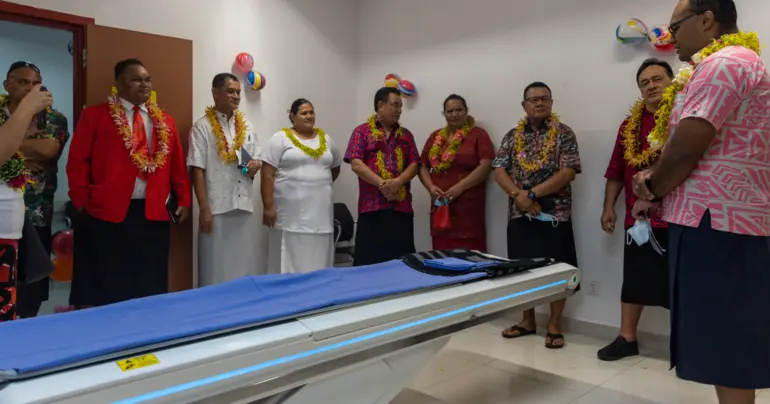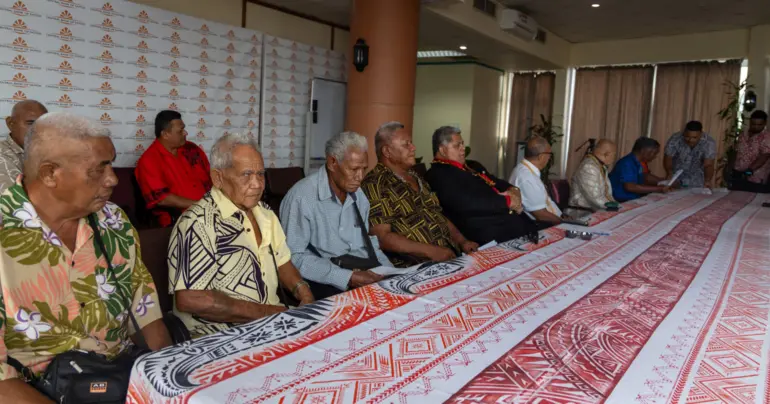A house of straws and a house of sticks
In the popular fable about the three little pigs, the Big Bad Wolf was able to huff and puff and blow away the house of straws and sticks built by the first two pigs.
However, the house of bricks was not as poorly constructed as the first two. In modern day Samoa, we find this analogy very fitting to the way some of the donor funded or low interest loan buildings have been constructed.
China’s diplomatic policy of offering loans on low interest has been around the Pacific for more than a decade now and this is how so many of the Pacific countries have been able to develop infrastructure.
Most of these Chinese loans are through their Export and Import or EXIM Bank, and it comes with conditions that a Chinese construction company will be used and where the materials are sourced from. Just because these projects are run in partnership with the Government, there are hardly any serious checks on the quality of the work that has been done.
The real check on the quality of work happened when after a few years of construction the defects started to appear. This is what is now happening to a number of projects that were built in Samoa through similar loans.
The contractors want to get the job done as fast as they can and in many cases circumvent ways to reduce cost on material and labour, to increase their profit margins. These contractors will use the government connections to favour them as well.
Samoa is not the only nation that has been dealt a bad hand in such loan funded projects. Neighbouring countries like Fiji, Solomon Islands and Vanuatu also have stories of their own to tell.
This is an example of using one government department to bypass another. In all Pacific nations, including Samoa, there are building codes and at certain stages of construction, engineers who work for the government are to check the progress and then tick on the next phase.
From the state of the buildings, we can clearly see that most these buildings were just ticked on by the so-called engineers either through pressure from above or just someone not doing their job. There are hundreds of people working in some of the buildings that have been made through such funding and God forbid something does happen to some of them because of the flaws in construction.
We can still continue to use the loan schemes from donor countries but the important lesson for us to learn is not to compromise on our building standards. After the realisation, that storms and disasters in the region have become stronger, the regional call has been to upgrade building codes. This is to build more resilient buildings which will withhold against disasters and allow for future refurbishments.
As the Government of the day who asked or accepted these loans have a responsibility to also see that the building being constructed is of the best possible standard. There should be no compromise when it comes to quality especially in the construction of a major capital project.
There should be a department which looks after all construction activities across Samoa either residential or commercial and such a department should be independent, meaning free from ministerial interference. Such a department should employ a team of certified engineers who certify when the next phase of the project should carry on.
These projects which have been discussed in parliament are now costing more to maintain. If the checks and balances were maintained from the beginning, we would not be faced with the problem we are having now.
The Government now needs policy changes as well that will allow the construction of the best standard. Most nations in the Pacific are constructing buildings to withstand Category 5 Cyclones and in some of these Pacific countries, an engineer’s certificate for the house is not issued if the building code is not followed.
This should be the building principle for all constructions, donated, loaned or built on their own expenses.
There is a National Building Code of Samoa (NBC) which is a performance based set of standards that provides objectives and descriptions of how a building and site should be constructed to achieve a structurally-sound and sustainable built environment.
As a performance based document, the NBC describes the outcome of a development project rather than prescribing a step-by-step method of how to construct.
The basic objective of the NBC is to ensure that acceptable standards of structural sufficiency, fire safety, health, amenity and response to the impacts of climate change are provided so that buildings, facilities and sites are constructed, maintained and demolished in a safe and environmentally responsible manner.
The provisions in the NBC are intended to extend no further than is necessary to safeguard the health and safety of people and the environment. They are intended to be cost effective, not needlessly onerous in their application, to promote design innovation, and be easily understood.
Samoa has had this document or policy for some time now. Damage has already been done and blaming people will not change things but having a sound policy and an independent department of engineers to do such checks may improve things for the future.
And to sum up the analogy, the Big Bad Wolf is not the donor or the loan provider, it is the laxity of the policies or the watchdogs that allow such constructions to go ahead.











